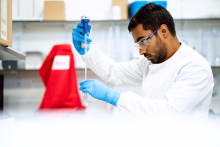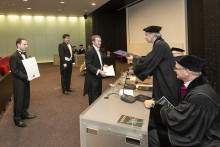Researchers currently work around an additional quarter of their hours in overtime, according to the Rathenau Institute’s report The Balance of Science, published yesterday. This means that if they are contracted for four days per week, they actually work five.
That is more than other university-educated workers, who typically put in ten percent overtime. Furthermore, absenteeism is increasing. On average, scientific staff call in sick three or four days per year – more than their peers outside academia.
Work pressure
Clearly, work pressure in academia is high and many researchers are struggling with the uncertainty of temporary contracts, according to the report. However, the problems occur not just among PhD students and postgraduates, who face fierce competition. Even researchers with a permanent contract are feeling the pressure.
Still, it is not all doom and gloom in the Dutch scientific community. In many areas, things are actually going well. The quality of the work being done is high, and there is also a lot of collaboration with businesses and public authorities, meaning the research that is being conducted has an impact on society.
With open access, things are moving in the right direction as well, as more and more publications are freely available to everyone. In addition, there is increasing interest in science among the general public and confidence is high, despite a small group of sceptics.
This explains why the Rathenau Institute is not ringing the alarm bell concerning work pressure, in contrast to the WOinActie protest movement. To the Institute, it is nothing more than an important ‘point for consideration’.
Stories
But can things really be good if researchers are working so much overtime and absenteeism is on the rise? ‘You hear stories of researchers who are struggling’, says Alexandra Vennekens, one of the authors. ‘It’s not entirely new. We looked into it in the past. It’s linked to how academia works, with a lot of competition and short-term projects. The political and institutional bodies are aware of this, and action is being taken.’
This calm tone may be a result of the report’s objective: the intention is not to take a position in the debate, but to ‘create a basis for that debate’, as Director Melanie Peters writes in her foreword.
Work pressure is not the only point of consideration. For example, the independence of academia – a potential drawback of collaborating with other parties – can also be called into question. Institutions will continually have to ask themselves whether collaborations fit their strategy and how their own independence can be guaranteed, advises the Rathenau Institute.







